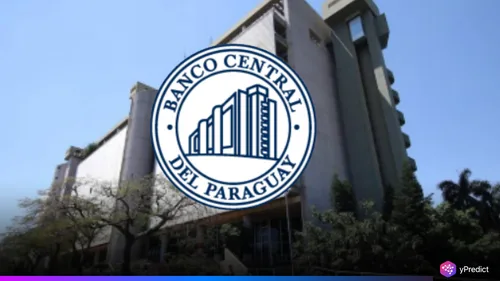
Paraguay’s central bank interest rate holds at 6%. This signals that policymakers are confident they can manage inflation without harming growth. The monetary policy decision demonstrates a careful and conscious balancing act between sustaining economic stability and controlling inflation, with Paraguay in the midst of various transitions stemming from global and regional economies.
The Central Bank of Paraguay announced their latest decision making processes, reflecting on the current economic environment. Officials cited their belief that inflation is well within target, based on stable domestic demand and favorable external conditions., With this decision, the bank aims to lend stability to markets while preparing for potential risks down the road.
The monetary authorities once again reiterated that inflation dynamics for the country remain well within ranges for the remainder of the year. On the regional front, economies were exhibiting mixed signals for recovery, so Paraguay welcomes the stability, as opposed to being pressured into aggressive movements to maintain their growth, while providing predictability to businesses, investors, and consumers.
Why the Central Bank Chose Stability
The fact that the Paraguay central bank is holding the interest rate at 6% indicates strong belief in the trajectory of consumer prices. Inflation is showing limited volatility lately and is continuing to stay near the mid-point in the target band, which allows policymakers to maintain conditions supportive of growth without additional financial pressure.
Central bankers emphasized the steady expectations they need to maintain with households and businesses. Unexpected changes in interest rates will only serve to create uncertainty in a year where external markets are unpredictable – not only do you lose credibility when you raise rates to control inflation, but also your credibility when you maintain or lower rates. Paraguay’s signalling indicates it has its monetary policy management under control.
Inflation Outlook in Paraguay for 2025
Paraguay expects inflation to stay within the target range through the year. Analysts point to steady food prices, moderate fuel costs, and stronger supply chains as key reasons. These factors keep current inflation pressures under control.
Global factors like commodity prices and worldwide demand still matter. However, analysts say Paraguay’s diverse economy and careful monetary policy give it strength against unexpected shocks. The central bank will act if inflation moves away from the target, but for now, it sees a stable and balanced outlook.
Global and Regional Context Behind the Decision
Paraguay’s action follows a pattern seen in latin America, as many central banks have moved to a deliberate step-wise process of rate cuts. The region is in a difficult position given the need to weigh competing objectives of stimulating growth against the possibility of recurring price increases.
In this environment, Paraguay’s action to maintain its monetary policy decision is prudent. The step-wise response protects the economy against shocks from abroad as it helps recuperate lost investor confidence. Further, consistent /stable monetary policy strengthens the financial sector in supplying credit flow to productive sectors.
Impact on Businesses and Households
By maintaining the Paraguay central bank interest rate at 6%, the country also provides an element of certainty for companies considering making an investment and for households considering managing their credit. Having lower uncertainty around borrowing costs allows companies to expand their operations, whilst allowing households to manage their loans with certainty.
Financial markets also prefer the consistency of policy. Exchange rates and sudden changes in monetary policy can cause disruption to the inflow of investment into the country, however, with a steady hand, it gives domestic and foreign participants confidence in the local currency. Paraguay’s decision serves as a stabilising anchor in an uncertain global climate.
Looking Ahead: What to Expect Next
The bank continues to watch global trade risks, energy prices, and financial markets for early signs of inflation pressure. If inflation shows quick and persistent rises, policymakers will raise rates to protect stability. If growth slows sharply, they will cut rates to support demand and recovery.
For now, the focus remains on balance. Leaders recognize upside opportunities but also prepare for external risks. Paraguay aims to keep inflation under control while building conditions for long-term, sustainable economic growth.







